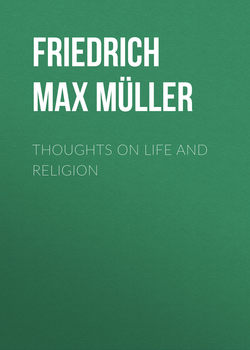Читать книгу Thoughts on Life and Religion - Friedrich Max Müller - Страница 2
THE ART OF LIFE
ОглавлениеTo learn to understand one another is the great art of life, and to 'agree to differ' is the best lesson of the comparative science of religion.
Silesian Horseherd.
There is a higher kind of music which we all have to learn, if our life is to be harmonious, beautiful, and useful. There are certain intervals between the young and the old which must be there, which are meant to be there, without which life would be monotonous; but out of these intervals and varieties the true art of life knows how to build up perfect harmonies.... Even great sorrow may be a blessing, by drawing some of our affections away from this life to a better life … of which, it is true, we know nothing, but from which, when we see the wisdom and love that underlie this life, we may hope everything. We are meant to hope and to trust, and that is often much harder than to see and to know.... The greatest of all arts is the art of life, and the best of all music the harmony of spirits. There are many little rules to be learnt for giving harmony and melody to our life, but the thorough bass must be—love.
Life.
One thing is necessary above all things in order to live peaceably with people, that is, in Latin, Humanitas, German, Menschlichkeit. It is difficult to describe, but it is to claim as little as possible from others, neither an obliging temper nor gratitude, and yet to do all one can to please others, yet without expecting them always to find it out. As men are made up of contradictions they are the more grateful and friendly the less they see that we expect gratitude and friendliness. Even the least cultivated people have their good points, and it is not only far better but far more interesting if one takes trouble to find out the best side and motives of people, rather than the worst and most selfish.... Life is an art, and more difficult than Sanscrit or anything else.
Life.
We become chiefly what we are more through others than through ourselves, and happy is the man whose path in life leads him only by good men and brings him together with good men. How often we forget in judging others the influences under which they have grown up. How can one expect a child to be truthful when he sees how servants, yes often parents, practise deceit. How many children hear from those to whom they look up, expressions, principles, and prudent rules of life, which consciously or unconsciously exercise an influence on the young life of the child. Yet with how little of loving introspection we pass our judgments.
MS.
If you want to be at peace with yourself, do not mind being at war with the world.
MS.
